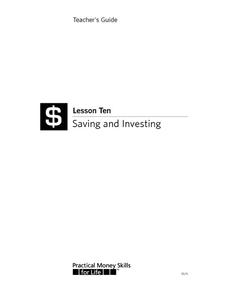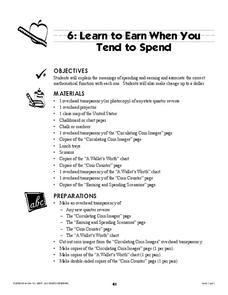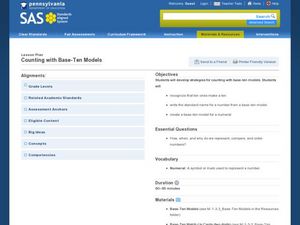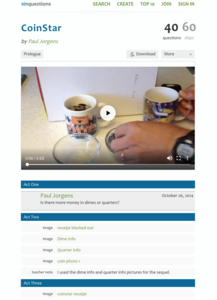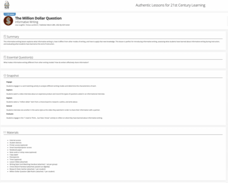Visa
Allowances and Spending Plans
Help youngsters understand how to manage small amounts of money by discussing an allowance and the difference between spending, saving, and giving.
Practical Money Skills
Saving and Investing
Learn the difference between saving money and investing money, as well as the advantages and disadvantages of each. Kids review banking and personal finance terms before studying the different ways that people can reach their financial...
Practical Money Skills
Making Decisions
Money represents decisions: spending decisions, saving decisions, and investing decisions. Encourage young adults to think about the decisions they make with their money in a three-day unit about personal finance, consumer spending, and...
Visa
Making Spending Decisions
By role playing real-world experiences, such as purchasing snacks and grocery/toy store shopping, your youngsters will begin to develop an understanding of how to make decisions and choose between alternatives. This is the first lesson...
Visa
Saving and Investing
Impress upon your young adults the importance of saving and investing, and give them a foundational vocabulary from which they can continue to build their financial literacy. This lesson plan covers short- and long-term budget goals,...
Anti-Defamation League
Harriet Tubman on the $20 Bill: The Power of Symbols
How important are symbols and symbolic gestures in society? Middle schoolers have an opportunity to analyze the importance of symbols on American currency with a lesson plan that investigates the controversies surrounding redesigning the...
Practical Money Skills
Buying a Home
Guide high schoolers through the process of buying a house with a simulation lesson. As pupils learn about mortgages, renting versus buying, and home inspections, they discuss ways to make informed financial decisions and sound purchases.
Math Worksheets Land
Properties of Operations as Strategies: Step-by-Step Lesson
If you are looking for a visual warm-up on the commutative property, this might be the one. There is just one problem here, and you will need to guide learners through it since the objective isn't clear. They practice the commutative...
Practical Money Skills
About Credit
It's tempting to stay away from credit cards entirely, and it can also be tempting to charge large purchases on credit cards with the intention to pay them off later. But as a three-part lesson on credit and debt shows your high...
Wells Fargo
Hands on Banking
What happens to your money between the time you make a bank deposit and the time you decide to spend it? Take middle schoolers and teens through the process of opening checking and savings accounts, creating a personal budget,...
Encyclopedia Britannica
Do the Campaign Math
Follow the money trail! As part of their study of the 2020 Presidential campaign, class members to research how much money candidates have raise and spent, as well as the sources of the funds. They then graph their findings to compare...
Curated OER
Counting Coins
Second graders identify a quarter, dime, penny, nickel, and dime. They match the coin with it's monetary value, collect data on excel spreadsheet, and create a graph in Excel. Students participate in group activities.
Curated OER
Learn to Earn When you Tend to Spend
Analyzing and understanding word problems is extremely important. Pupils learn that in money problems, earn usually means you add and spend usually means you subtract. They will solve a series of money-related word problems, label coins,...
Bowland
Explorers – Patrol Services
Far out — plan a trip to space! Aspiring mathematicians steer a space vehicle through an asteroid field, calculate currency exchanges to buy provisions, and determine placement of charges to blow up asteroids. Along the way, they learn...
Curated OER
Budget Mania
Students examine several examples of budgets to develop a facility with the components of its formation. Income, expenses, and expenditures are considered and itemized for this instructional activity.
Curated OER
Counting with Base - Ten Models
Help your kids develop strategies for counting. In this base-ten lesson, learners use matching cards, base 10 blocks, and dry erase markers and boards to examine the base 10 counting system.
Bright Hub Education
"Where the Red Fern Grows": A Lesson on Love and Devotion
Where the Read Fern Grows by Wilson Rawls is rich with themes relating to love and family. Help your class to understand these themes with the series of reading activities included in this unit outline. Readers can keep a journal to...
101 Questions
CoinStar
Would you rather have a bowl of dimes or a bowl of quarters? A video introduces the problem by presenting two bowls, one full of quarters and another full of dimes. Learners use information from a CoinStar receipt to calculate the number...
EngageNY
Volume and Cavalieri’s Principle
Take a slice out of life. The ninth section in a series of 23 introduces classmates to Cavalieri's principle using cross sections of a cone and stacks of coins. Class members participate in a discussion using pyramids and how Cavalieri's...
Curated OER
You've Gotta Have a Gimmick!: A Lesson in Junk Food Advertising
Students examine marketing techniques used in television and magazine snack food ads. They analyze and discuss Internet kids clubs, complete various handouts that examine ads for food, and create a commercial for a food product.
Practical Money Skills
Understanding Credit
Help your young consumers learn about credit and the importance of credit history. With a thorough lesson about the ins and outs of credit, as well as the potential pitfalls of having a line of credit, kids will be well-equipped to...
Curated OER
Penny Science
A penny can be a much more valuable teaching tool that you might think. Whether you are teaching about chemical reactions, surface tension, the behavior of gases, or are just looking for engaging activities for early finishers, this...
K20 LEARN
The Million Dollar Question: Informative Writing
Introduce high school freshmen to the characteristics of informative writing with a 5-day lesson that distinguishes informative writing from other modes. Scholars learn how to search for and cite reliable resources, then research and...
Practical Money Skills
Using Banking Services
Using a bank is a privilege and a responsibility for young consumers. Teach them the important terms and details about creating accounts, using an ATM, and maintaining a credit card.
Other popular searches
- Money Lessons Giving Change
- Counting Money Lessons
- Canadian Money Lessons
- Second Grade Money Lessons
- 2nd Grade Money Lessons
- Australian Money Lessons
- Shopping Money Lessons
- Math Money Lessons
- Money Lessons Elementary
- Fun Money Lessons
- Counting Money Math Lessons
- Adding Money Amounts Lessons






